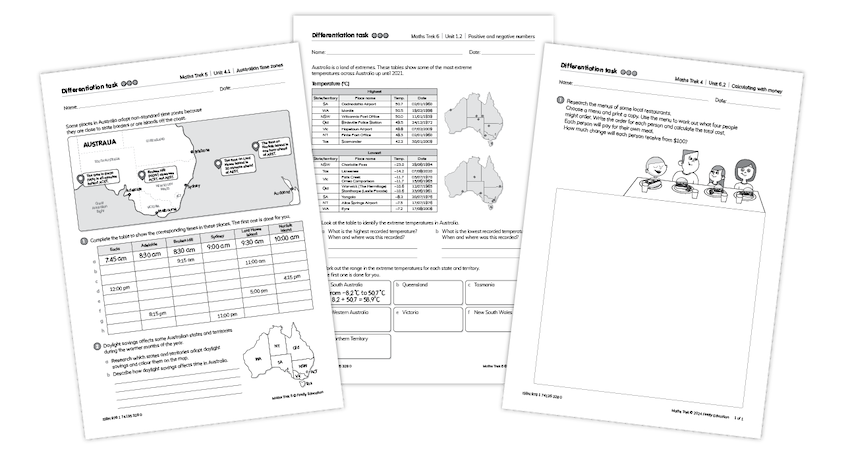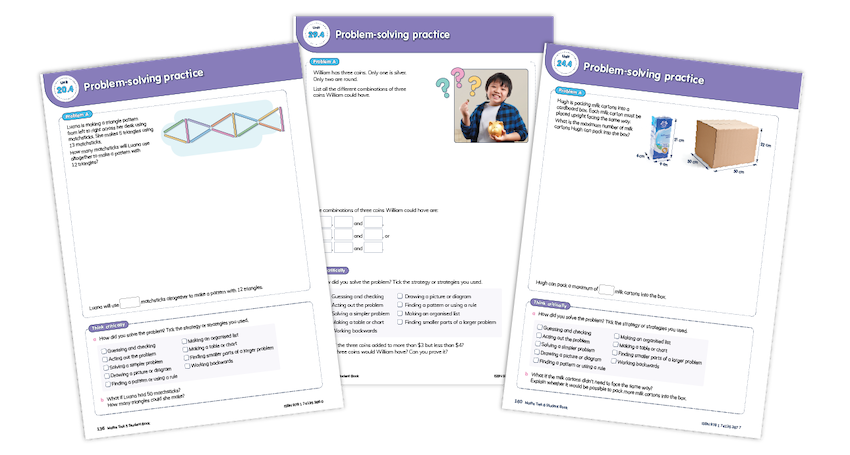Articles & Videos
Embracing productive struggle with Maths Trek
Categories
Subscribe to our newsletters
Receive teaching resources and tips, exclusive special offers, useful product information and more!
Embracing productive struggle with Maths Trek
Maths Trek 19/8/24

One of the biggest hurdles in maths education is encouraging students to persevere when problems become complex. Although maths teaching is often associated with rules and algorithms, resilience and mindset are equally important for student performance. Students who demonstrate perseverance and are adept at managing stress levels outperform their peers academically and are more engaged in learning. 1 Developing a growth mindset helps students overcome negative attitudes concerning their perceived ability in maths and rise to a challenge more easily. 2
What is productive struggle and why is it important?
Productive struggle describes the cognitive process by which a child tackles and engages with a complex problem to find meaning. 3 When conducted in a safe learning environment, productive struggle can improve a student’s attitude towards maths and problem-solving, equipping them with skills to overcome obstacles, deepen understanding and build mathematical fluency. 4
Ways to set up a classroom environment for productive struggle
Be up-front about the challenging nature of activities
For productive struggle to be valuable, make students aware that a challenge is coming and encourage them to adopt a positive mindset. 5 Make it clear that you expect students to persevere but explain that all thinking related to the task is valuable, even if they don’t find a solution.
Praise perseverance and creative problem-solving over performance
To help students develop a growth mindset, praise them for their effort, perseverance and creativity. By celebrating persistence over performance, students will see that mathematical ability is not fixed and can improve with effort and time. It also helps students view setbacks or mistakes as learning opportunities. 5
Give students time and an appropriate level of support
To align with Vygotsky’s Zone of Proximal Development, an activity must be challenging but achievable with support. 6 Dedicate plenty of time for students to interpret a problem and implement a variety of ideas, and be equipped with prompts to guide thinking. It is important to provide the right level of scaffolding without removing the obstacle.
Model, collaborate and discuss
Working together and sharing solutions and ideas helps students make connections, engage with the activity, develop social and emotional skills and piece together their own understanding. Share your own solution to a problem, explaining all the mental steps in the process to demonstrate productive struggle out loud, and encourage students to do the same. 7
How Maths Trek can help
Maths Trek has a wealth of embedded activities both big and small that provide opportunities for productive struggle. Start with simple, bite-sized opportunities and build up to more complex, open-ended activities. Here are four Maths Trek activities to try in your classroom that offer an opportunity for productive struggle:
Challenges
The Challenge tasks in the Years 2–6 Student Book topics are short, engaging activities designed to extend student thinking and encourage students to apply their understanding of the topic at a higher level. These bite-sized activities allow you to frequently provide opportunities for productive struggle in a way that students can anticipate. Encourage collaborative thinking by having students work in pairs or small groups to find an answer and discuss the results.

Example of a Challenge activity from Maths Trek 3: Unit 11.3 Equivalent number sentences.
Extension tasks
At Maths Trek Online, you’ll find extension tasks for topics from Foundation to Year 6. These tasks extend directly from the activities students complete in the Student Book and are a great way to keep fast finishers engaged with higher-order thinking activities. Try using the tasks to challenge individual students, or have students work in pairs to complete the activity together.

Example of extension differentiation tasks from Maths Trek 5: Unit 4.1 Australian time zones, Maths Trek 6: Unit 1.2 Positive and negative numbers and Maths Trek 4: Unit 6.2 Calculating with money.
Problem-solving practice activities
Once students have learned problem-solving strategies in Years 1–6, they move on to problem-solving practice activities. Students independently complete the Student Book practice activity to solve an unfamiliar problem. This is followed by a Think critically section that can be completed independently, in pairs or small groups, or unpacked as a whole class. This provides an opportunity to discuss strategies and solutions and unpack how students overcame any struggle to arrive at the solution. Articulating thought processes greatly helps students piece together their own understanding. This is a valuable opportunity for students to articulate and reflect on their productive struggle.
Use the detailed teacher notes at Maths Trek Online to provide appropriate scaffolding and prompting to support productive struggle without removing the obstacle. Remind students of the value of all task-related thinking as they work towards a solution independently or in collaboration with their peers.
 Example of problem-solving practice activities from Maths Trek 5: Unit 20.4, Maths Trek 3: Unit 29.4 and Maths Trek 6: Unit 24.4.
Example of problem-solving practice activities from Maths Trek 5: Unit 20.4, Maths Trek 3: Unit 29.4 and Maths Trek 6: Unit 24.4.
Investigations
These extended whole-class activities are designed for students to apply maths concepts to unfamiliar mathematical problems. Due to the complexity of investigations, there are many opportunities for productive struggle as students work their way through the steps over the course of a week.
The detailed online teacher notes include guiding questions to support student thinking without removing the obstacle entirely. For example, in the Year 3 investigation Cube conundrum, students join cubes together to create new objects and investigate their properties. To support students, teachers can ask questions such as ‘Which object has the most faces and vertices?’ and ‘Do any have the same number of faces and vertices?’.
Have students complete investigations in groups and ensure there is plenty of discussion to help students work through challenging content and find meaning.

Example of an investigation from Maths Trek 3: Unit 27 Cube conundrum.
Supporting productive struggle is just one of the amazing benefits of using the Maths Trek program. There’s so much more to discover. Request a free trial today and explore for yourself!
References
Schleicher, A 2022, PISA 2022 Insights and interpretations, Report, Organisation for Economic Cooperation and Development, viewed 5 August 2024, https://www.oecd.org/pisa/PISA 2022 Insights and Interpretations.pdf↩
Kaya, S & Karakoc, D 2022, ‘Math mindsets and academic grit: How are they related to primary math achievement?’, European Journal of Science and Mathematics Education, vol. 10, no. 3, pp. 298–309, https://doi.org/10.30935/scimath/11881↩
DiNapoli, J 2021, ‘Investigating perseverance improvement in secondary mathematics students’, in E de Vries, Y Hod, & J Ahn (eds), Proceedings of the 15th International Conference of the Learning Sciences, ICLS 2021, pp. 871–872. Bochum, Germany: International Society of the Learning Sciences.↩
Murdoch, D, English, AR, Hintz, A & Tyson, K 2020, ‘Feeling heard: Inclusive education, transformative learning, and productive struggle’, Educational Theory, vol. 70, no. 5, pp. 525–679, https://doi.org/10.1111/edth.12449↩
Dweck, CS & Yeager, DS 2021, ‘A growth mindset about intelligence’, in GM Walton & AJ Crum (eds), Handbook of Wise Interventions, The Guilford Press, New York, pp. 9–35.↩
Margolis, AA 2020, ‘Zone of proximal development, scaffolding and teaching practice’, Cultural-Historical Psychology, vol. 16, no. 3, pp. 15–26, https://doi.org/10.17759↩
Cai, J & Leikin, R 2020, ‘Affect in mathematical problem posing: conceptualization, advances, and future directions for research’, Educational Studies in Mathematics, vol. 105, pp. 287–301, https://doi.org/10.1007/s10649-020-10008-x↩